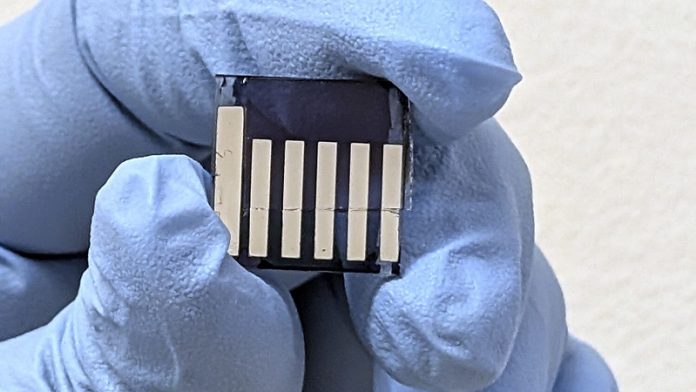
Imagine having a powerful scientific tool built right into your smartphone—small enough to fit inside a single pixel, yet strong enough to detect chemical signatures by analyzing light.
Thanks to researchers at North Carolina State University, this could soon be a reality.
Spectrometers are tools that analyze light to tell us what materials are made of. They’re widely used in science, medicine, manufacturing, and even in space exploration.
For example, they help doctors diagnose diseases and scientists understand what stars are made of. But there’s a catch: even the smallest current spectrometers are still bulky and not easy to carry around.
Now, a team led by Professor Brendan O’Connor has developed a tiny spectrometer that works just as well as traditional ones—but it’s small enough to fit on a phone.
Their new device is made from a special kind of sensor called an organic photodetector, which is only a few square millimeters in size.
What makes this technology special is its simplicity and power. The sensor can detect a wide range of light, from ultraviolet (UV) to near-infrared (NIR), and it works at very low voltage—less than one volt. Even better, it works incredibly fast.
It can measure how light behaves when it hits or passes through a material in less than a millisecond.
Here’s how it works: by applying different low-voltage signals to the tiny sensor, scientists can control which wavelengths of light it picks up.
These different readings are then run through a basic computer program, which puts together a detailed picture of the light signature. This allows researchers to figure out what materials the light has interacted with.
Earlier attempts to shrink spectrometers had problems—some needed complicated optical setups, others used too much power or couldn’t detect a wide enough range of light. This new version avoids all of those issues while still delivering high accuracy and performance.
In tests, the NC State team showed that their miniature spectrometer is just as accurate as traditional lab instruments and as sensitive as commercial photodetectors.
Professor O’Connor says the ultimate goal is to make this tiny sensor available for everyday use.
It could someday be built into consumer devices like smartphones, allowing users to perform scientific-level analysis on the go. You might be able to check the freshness of food, test water quality, or monitor your health—all from your phone.
This innovation could also open new doors for scientific research, making advanced tools like imaging spectroscopy and microscopic light analysis more accessible and affordable for labs everywhere.
Source: North Carolina State University.



